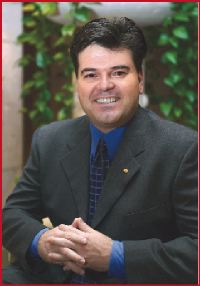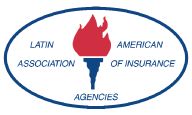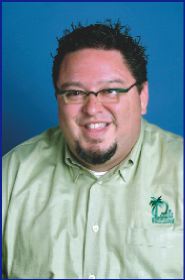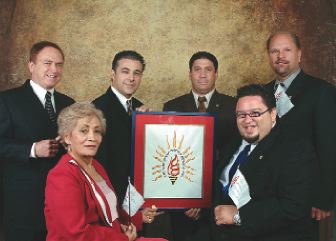
MARKETING
Two Hispanic agents associations
educate and insure the growing Latino market
By Elisabeth Boone, CPCU

Daniel Baptista, CPIA, is President of the Florida-based Latin American Association of Insurance Agencies (LAAIA).
 These days, you don't have to be Hispanic to know the meaning of se habla Espanol: "We speak Spanish." But when it comes to meeting the needs of this country's rapidly growing Hispanic population, it's even more important to be able to say se habla seguro: "We speak insurance."
These days, you don't have to be Hispanic to know the meaning of se habla Espanol: "We speak Spanish." But when it comes to meeting the needs of this country's rapidly growing Hispanic population, it's even more important to be able to say se habla seguro: "We speak insurance."
Hispanics represent the fastest growing segment of the U.S. population and are now the country's largest minority group, according to the U.S. Census Bureau. Census Bureau population data released last June shows that in 2002 there were 38.8 million Hispanics in the United States, compared with 38.3 million African Americans. Hispanics accounted for nearly half of the country's population increase of 7 million, to 288.4 million, since 2000.
The Census Bureau estimates that by 2025, Hispanics will number 61.4 million, or 18.2% of the population. Census figures also show that Hispanics account for $800 billion a year in goods and services, and that Hispanic buying power will only increase with time. That buying power is growing at a compound annual rate of 8.7%, whereas the non-Hispanic rate is growing by only 4.8% a year.
As the U.S. Hispanic population grows, its influence increasingly is felt in such diverse arenas as business, politics, education, culture, entertainment, and cuisine. America's expanding Hispanic population has many faces. Border states like Texas, Arizona, and California are home to heavy concentrations of Mexican nationals, while Florida attracts newcomers from Cuba, Puerto Rico, and Caribbean island nations. Almost every major U.S. city draws immigrants from these places as well as from the countries of Central and South America. Ethnically and culturally diverse, the surging wave of Hispanic Americans constitutes a market of impressive dimensions and power.
Trust is key
Many Hispanics have lived and worked in the United States for generations; others are new arrivals eagerly seeking a piece of the American dream. Whether they've been here a hundred years or a hundred days, Hispanic Americans tend to live in close-knit, supportive communities where family ties are strong and cultural traditions are cherished. Learning English is a key part of assimilation, but Spanish is still the language of home and neighborhood.
 The board of Latin American Association of Insurance Agencies (LAAIA): Seated from left, Immediate Past President Angel Del Toro, CPIA; President-Elect Dulce Suarez-Resnick, CPIA, AIS, CPIW; President Daniel M. Baptista, CPIA. Standing, from left, Secretary Maria L. Belloso; Vice President Marcos A. Alvarez, CPIA; Director Joseph Garden, CPIA.
The board of Latin American Association of Insurance Agencies (LAAIA): Seated from left, Immediate Past President Angel Del Toro, CPIA; President-Elect Dulce Suarez-Resnick, CPIA, AIS, CPIW; President Daniel M. Baptista, CPIA. Standing, from left, Secretary Maria L. Belloso; Vice President Marcos A. Alvarez, CPIA; Director Joseph Garden, CPIA.
Especially for newcomers to the United States, navigating the intricacies of business and commerce can be a formidable challenge. Hispanics are far less likely than other groups to make purchases via Internet, phone, or mail. By tradition and culture, they prefer to do business face to face, with people they know and trust--particularly when it comes to important decisions like buying insurance. Standing ready to help are the independent agents who belong to two associations for Hispanic agents: the Latin American Association of Insurance Agencies (LAAIA), based in Florida, and the Latin American Agents Association (LAAA), whose headquarters are just outside Los Angeles. Both organizations seek to educate Hispanic Americans about insurance, arrange appropriate coverage for their homes, vehicles, and businesses--and, in the process, bring them into the American mainstream. Both LAAIA and LAAA are tireless advocates for their members and seek to forge strong ties with insurers as well as local government and business leaders.
35 years and growing
The Latin American Association of Insurance Agencies, which will celebrate its 35th anniversary this year, was established in Miami in 1969. Its mission statement says: "The Latin American Association of Insurance Agencies is an association of insurance professionals whose purpose is to protect the rights of its members for the benefit of the consumer through education, information, networking, and active participation in the political environment and community service." LAAIA strives to foster an insurance environment that is beneficial to agents and fair for consumers by pursuing initiatives in the areas of legislation, education, communication, and community support.
Serving as president of LAAIA is Daniel Baptista, CPIA, who owns the Sol Insurance Agency in the Little Havana section of Miami. Established in 1995, the agency offers all lines of insurance and represents Progressive Insurance, GMAC Insurance, First Floridian/Travelers, Mercury Insurance, and a number of nonstandard auto carriers. The agency has a staff of five, all of whom are bilingual in English and Spanish and some of whom speak French and Portuguese.
Who started the Latin American Association of Insurance Agents, and why? "Back in 1969, there was a group of seven Hispanic agents who saw a clear need to establish a recognized association that would cater to the Hispanic agency force here in south Florida," Baptista explains. "These seven individuals collaborated to form the association, and it began operations in January of 1970."
LAAIA membership currently stands at about 400 agencies. Members are based predominantly in Florida, but several other states also are represented, including Texas, California, and Illinois. The association has an executive board composed of five individuals, and its affairs are overseen by an 11-member board of directors that includes the executive board as well as an agency-company liaison, a charities director, three operation directors, and a convention coordinator. Executive directors are required to make a five-year commitment, during which they move up the chairs to the presidency.
Building bridges
Currently serving as agency-company liaison is Greg Gold of the MacNeill Group, Inc. "He keeps an open channel between our board and the companies that are members of our association," Baptista says. "He is responsible for ensuring that we have quality speakers at our monthly meetings. He selects the topics that we discuss at our executive board meetings and makes sure that the appropriate persons participate. Greg also acts as the 'voice' for the companies when they have issues they want to present to the executive board. Having an agency-company liaison allows both the agents and the companies to have a strong network through which to communicate." For example, Baptista continues, "if a company wants to have an educational session to introduce a new product, we encourage that because it benefits our agents as well as the company."

 Andre Urena is Chief Executive Officer of the California-based Latin American Agents Association (LAAA).
Andre Urena is Chief Executive Officer of the California-based Latin American Agents Association (LAAA).
In association affairs as in the wider business world, a key component of success is strategic alliances. The LAAIA has such alliances with the IIABA, the FAIA, the Society of CPCU, and the CPIA. "Our relationships with these organizations vary in nature, from educational to legislative efforts," Baptista says. "We play a supporting role with the FAIA in its legislative work because we have such a high concentration of agents here in Florida. By uniting our voice with that of FAIA, we can help bring about the best possible scenario not only for the industry but also for our fellow Floridians."
LAAIA's relationship with CPIA, Baptista says, "allows us to give our members the opportunity to earn a professional designation and become masters of their craft. As a result, our members are successful, and their designations earn respect from their insurance companies. It's just another indication of their commitment to the industry."
LAAIA's alliance with the Society of CPCU likewise offers its members valuable educational opportunities. "At our most recent annual convention, the CPCU Society conducted some classes that our members could take for continuing education credit," Baptista says. "The Society was pleased to accommodate us, and its people appreciated our interest in its educational offerings."
More than anything else, Baptista says, "the educational opportunities we offer our agents promote accountability. Our diverse group is not just made up of Hispanics; our members come from many different backgrounds. Education allows our members to be accountable for their performance, and it allows companies to determine which agents are the masters of their craft so they can make good decisions on appointments. We're very proud of that," he comments. "We believe that one way we can place accountability in the hands of agents is to give them a choice, and the agents who are making those choices are finding out that success usually follows. We're happy to provide that small push."
Serving the Hispanic market
A handful of insurers has made an effort to penetrate the large and growing Hispanic market, with mixed results. Many observers say that insurers must strive to understand Hispanic culture and values, and respond with products and services that meet this group's needs. "I think commitment has a lot to do with it," Baptista remarks. "When a company is committed to the Hispanic market, it tells its associates and agents, 'We are here for the long haul. We may take our lumps in the beginning, but we're going to be here for the duration because we want to serve this market.' I think when companies approach the market in that fashion, they'll be successful. We know that commitment goes beyond printing materials in Spanish. Having a strong group of agents who really are sensitive to the Hispanic community will be a big part of success in the market."
Knowing that Hispanics represent the largest and fastest growing minority group in the country may be the extent of many insurers' awareness, Baptista says. "For example, insurers may not realize that there is a great deal of new home ownership among Hispanics. In 2000, the number of Hispanic homeowners rose 46%. That's 4.2 million families moving into new homes across the nation, and it represents a more significant increase than has occurred in any other market. The Hispanic market is not only growing, it's growing in every respect," he continues. "If insurers try to offer Hispanics just one particular line of business, they're going to hurt themselves. They really have to commit themselves not only to being in the market for the long haul, but also to providing every kind of insurance in their portfolios. By doing so, insurers will begin to see brand recognition. That's a major factor; Hispanics are looking for quality companies. If they see a company that's really taking care of them in one particular line of insurance, they'll inquire about others. They'll tell their families--and Hispanic families are usually large and close--and those relatives will start asking for a quote on that product from that company. If companies truly place commitment to the Hispanic market before success and appoint quality independent agents from the Hispanic community, they will succeed." Among insurers that he believes are genuinely committed to the Hispanic market, Baptista says, are First Floridian/Travelers, GMAC, Progressive, Mercury, and MetLife Auto and Home.
Challenges ahead
 The board of the Latin American Agents Association (LAAA): Standing from left, Richard Wetzel, Rafael Hurtado, Efrain Ferrer and Robert Simmons. Seated from left, Gladys Garcia and Andre Urena.
The board of the Latin American Agents Association (LAAA): Standing from left, Richard Wetzel, Rafael Hurtado, Efrain Ferrer and Robert Simmons. Seated from left, Gladys Garcia and Andre Urena.
What challenges and opportunities do insurers face in meeting the needs of Hispanic Americans?
"Just doing business in Florida is challenging enough," Baptista responds with a laugh. "For companies, I think the greatest challenge is bridging the gap between themselves and the Hispanic community. Certainly that means having product literature available in Spanish but, more than that, it means having quality agents present their products. It also means becoming involved in the Hispanic community, learning to understand its needs and values, knowing what holidays Hispanics celebrate, like Cinco de Mayo. The insurers I mentioned, and some others, have begun to embrace the Hispanic community, and they're starting to narrow that gap between themselves and Hispanics. Once an insurer gains the community's trust, it will find Hispanics to be very loyal customers.
"Contrary to popular belief, Hispanics don't live in bad neighborhoods and drive old cars," Baptista points out. "They live in suburbs, send their children to college, and work hard to pursue the American dream. Companies that understand the diverse nature of the Hispanic population will find it much easier to meet the challenges of serving this market."
On to California
Pursuing many of the same initiatives as LAAIA, plus several of its own, is the California-based Latin American Agents Association (LAAA). Founded in 1998, LAAA has 400 members throughout southern California, including general agents and insurers as well as retail agents and brokers. Some 100 members are insurance companies. Serving as chief executive officer is Andre Urena, the owner of Oasis Insurance Services in El Monte, just west of Los Angeles. Started from scratch in 1992 by Costa Rica native Urena and his former partner, Oasis is an all-lines agency that is dedicated to serving the Hispanic market. "The difference between us and our competition is that our loss ratio is anywhere from five to 10 points better because we deal with the Hispanic market."
Echoing Baptista, Urena emphasizes: "Hispanics like to do business face to face; they like to meet agents and employees in their offices. Once they trust you, they will refer friends and family to you. As a result, our advertising costs are a lot lower than those of our competitors." Over the years, Urena says, "We've learned that what is most important is to give superior service and to educate our customers. We want to make it as easy as possible for them to do business with us and to refer people to our agency." What's more, "Our office is on the street level so it's easily accessible to our customers. It's designed more like a travel agency than an insurance office. We have a counter so people can get help right away," he explains.
Trust is important in the Hispanic community for another reason, Urena observes. "Often Hispanic customers buy insurance not out of need, which is the right reason, but out of fear," he says. "They're afraid of getting pulled over by a police officer for not having current tags and then having the officer discover they don't have insurance. At our agency, we educate our customers about the need for insurance and make sure they buy adequate limits. We also help our customers understand what they're buying beyond just their immediate need." Once a Hispanic customer understands insurance, Urena says, "typically he stays with your agency and buys more products."
Many new immigrants come from countries where insurance isn't required, Urena says. "In Latin America, insurance is for people who have things. If you don't have a lot of assets, you don't have anything to protect, and you've probably never dealt with insurance," he remarks. "People come here looking for a better future, and we show them how insurance can help them do that." On the life, health, and financial services side, Urena says, "We do more than show people how life insurance can help when they die; we also introduce them to products that are useful in planning for their retirement and for their children's education. We take the time to help new immigrants become informed customers."
Unfortunately, not all insurance carriers have been successful in their efforts to penetrate the Hispanic market. Urena agrees with Baptista: "I believe that there is a significant difference between what insurance companies think is the best way to approach the Hispanic market and the way we do it," he observes. "What is hard for insurance companies to understand is that serving the Hispanic market involves more than just translating literature and forms into Spanish. That is not the key. The key is to have retail agents on the ground who understand the Hispanic community and know that Hispanics like to do business in person. Hispanics traditionally don't like to use 800 numbers or the Internet, even if they have access to computers, because they prefer to shake hands with the agent who sells the policy. They also like to go to the agency's office in person to pay their monthly premiums."
Birth of LAAA
Several years ago, Urena's agency operated offices in Florida for a short time before deciding it would be more profitable to focus exclusively on California. "While we were in Florida, we found out that there was a Hispanic agents association that had been around for a long time (the Latin American Association of Insurance Agents). When I returned to California, I decided we needed an organization that could address the needs of Hispanic agents and insurance buyers. That's when I started the Latin American Agents Association."
Like its Florida counterpart, LAAA developed a mission statement that underscores its commitment to supporting Hispanic insurance professionals. The statement reads: "Guided by our dedication to the interests of the Hispanic insurance community, our mission on behalf of insurance agents and brokers in the Latin American Agents Association is to: be their unrelenting legislative, judicial, regulatory, and industry advocate; vigorously promote to the Hispanic public the value of their professional services; enhance their competitive position and fulfill their business needs; and foster excellence and integrity in their business practices."
Somewhat to Urena's surprise, the fledgling organization took off like a rocket. "I didn't know back then how fast or how big the association would grow," he says. "Today the Latin American Agents Association has the best attended monthly meeting of any insurance trade group. Our Los Angeles meeting has between 100 and 200 people every month, and our San Diego meeting has about 35 to 100 people each month. Our convention, which is held every year in May, brings anywhere from 1,200 to 1,500 people and is well attended by insurance companies as well as agents," Urena continues. "Just like our monthly meetings, we try to have an entertaining and educational program and to create an atmosphere where people can learn and relax. If you come to one of our events, we promise we will give you something that will make you money tomorrow. At the convention, we have presentations from insurance companies, and we bring in quality vendors. We make sure that our agents see that many insurance companies contribute to the association."
As proof of its commitment to fostering communication between agents and brokers on the one hand and insurers and general agents on the other, LAAA has two advisory boards: a 10-member Agent/Broker Advisory Board and a nine-member Company/GA Advisory Board. "Typically, an agent trade group has only one board and considers only the agent's point of view," Urena says. "We have two boards because we want to promote an open dialogue between agents and companies. It helps bridge the gap that has long existed between retail agents and insurance companies. It allows us to analyze issues from both sides and reach a happy medium. When we have board meetings, both agents and companies are involved, so each side gets to voice its opinion. The insurance companies that participate in our group are eager to take part because they appreciate having a say in issues that affect them."
Making connections
LAAA also forms and maintains relationships with vendors outside the insurance industry that might be of service to its members. Service providers run the gamut from carpenters to computer specialists, Urena says. "Say you're an agent and you need a good-quality carpenter in a certain area," he says. "We'll give you the name of a carpenter that one of our members has used in the past. We can save our members time and money by referring them to providers that we already know do good work." Urena points out that LAAA "doesn't operate like a traditional trade group, which typically has connections just with insurance companies. We try to help our members find everything they need to do business. For example, an agent might be considering opening an office in a certain area, or might want to expand into lines beyond personal property and casualty. We share our experience to help him make a good decision and provide key contacts that can be useful."
When LAAA was first started, its agent members offered primarily personal auto insurance, Urena says. "Today our members sell life, health and commercial lines as well as personal coverages. We help our members diversify. We make sure that everyone is able to do the kind of business he or she wants to do." LAAA strives to help increase the business of agents and brokers who serve inner city and ethnically diverse communities in California by implementing urban opportunity programs. The association also offers training seminars to help agency owners and employees become better informed and more professional, and it explores and advocates technologies that improve the efficiency of insurance product delivery. Further, LAAA works to enhance the competitive position of its members by providing common advertising avenues. In short, LAAA does everything it can do to advance its members' interests, promote the growth of their business, and promote open communication among agents, insurers, and consumers.
Leading the charge
The burgeoning Hispanic population, with its vast buying power and impressive upward mobility, is an appealing target for independent agents and insurers alike. Succeeding in this market requires a keen understanding of the values and attitudes that underlie the Hispanic culture, and a willingness to invest the time it takes to build relationships based on trust. Clearly at the forefront of this effort are the Latin American Agents Association and the Latin American Association of Insurance Agencies, both of which can truly say to clients and prospects, Se habla seguro: "We speak insurance." *
For more information:
Latin American Association of Insurance Agents
Contact: Daniel Baptista
Phone: (305) 643-2333
Web site: www.laaia.com
Latin American Agents Association
Contact: Andre Urena
Phone: (626) 444-0999
Web site: www.latinagents.com